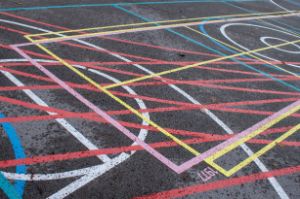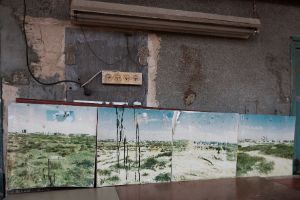

Céline Condorelli, Play for Today, installation view, École de la Porte d'Eau, 2022. Photograph by Caroline Douau © FRAC Grand Large
Céline Condorelli
Play for Today, 2021 / 2024
This work speaks of limits: those that determine the contours of our movements, those that prevent us from physically accessing a place and those that we are authorised to cross. Play For Today thematises the prohibition of participation and thus the exclusion of certain members of society, specifically the ban on women playing on sports fields.
We tend to think of play as a form of inclusion, fun and fair exchange. And yet most of us probably also remember instances, perhaps as a child, of not being part of a game, a feeling of being left behind. People often seem to find reasons why others cannot play. This large-scale installation by Céline Condorelli looks at the complex issues of inclusion through societal norms, gender bias and equality.
Visitors are invited to enter various sports fields overlayed on top of each other – badminton, basketball, football, pétanque, volleyball and a running track. The field lines are painted in the official colours be they orange, red, white or yellow. Somewhere along the borders, one notices dates: 1920, 1921, 1926, 1952, 1956 and… 1977. They mark the years in which women were allowed to compete in international tournaments in the respective sport. In the case of women’s football, permission was initially withdrawn and only granted again in 1971. And even today, what is officially called the “European Championships” is exclusively contested by men. In addition, the participation opportunities for trans athletes are still unclear.
Play For Today addresses the question of who has the right to play. The work is presented alongside a series of workshops on gender bias and queerness in sport. It serves as a multidirectional field for play, critical dialogue and collective action towards a more inclusive society.
Céline Condorelli is an artist based in London. Condorelli has a long-standing interest in the notions of work and play, her output addresses the boundaries between public and private, art and function, labor and leisure, in order to reimagine culture and society, as well as the role of artists within them.
